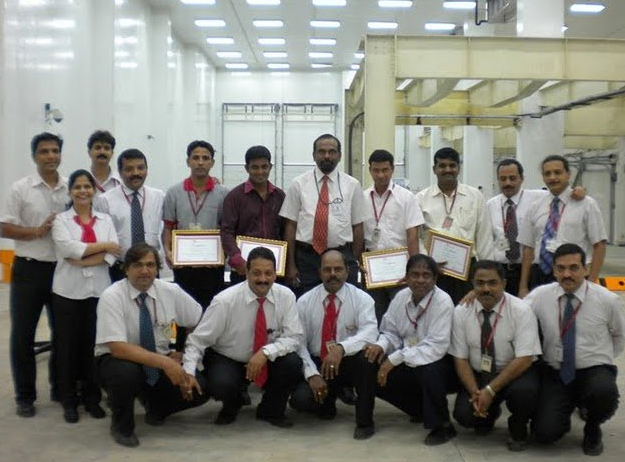Big
Chill In Mumbai
 |
Air cargo from
Indian airports has witnessed rapid growth in the last five years: international
cargo is seeing a growth of 10.5 percent while domestic is around 25
percent. According to figures from the Ministry of Civil Aviation, the
overall growth has been around 15.3 percent. The forecast for the next
ten years points out that the growth for international cargo would be
around 9.6 percent while domestic cargo would be 11.7 percent, while
the overall growth is forecasted at 10.47 percent. In such a situation,
international airports around the country are looking out for world
class air cargo handling service providers.
 International
airports at Mumbai and Delhi will soon have world class cargo handling
services. Incidentally, private players operate both airports, and the
cargo handling is provided by Cargo Service Center India (CSC India).
Led by seasoned professional Radharamanan Panicker, CEO, (right) and
backed by a team of more than 700 trained staff, CSC hopes to bring
about a sea change in the handling of air cargo business. Committed
to providing world class services, Panicker pointed out that CSC was
keen to provide services that would be “unlike other handling
companies. We provide total cargo handling solution – physical,
document and information handling. We do not rest on our achievements,
but constantly keep raising the bar and keep innovating.” International
airports at Mumbai and Delhi will soon have world class cargo handling
services. Incidentally, private players operate both airports, and the
cargo handling is provided by Cargo Service Center India (CSC India).
Led by seasoned professional Radharamanan Panicker, CEO, (right) and
backed by a team of more than 700 trained staff, CSC hopes to bring
about a sea change in the handling of air cargo business. Committed
to providing world class services, Panicker pointed out that CSC was
keen to provide services that would be “unlike other handling
companies. We provide total cargo handling solution – physical,
document and information handling. We do not rest on our achievements,
but constantly keep raising the bar and keep innovating.”
The first facility designed, developed
and built is the 2,000 square meters Perishable Cargo Terminal at Mumbai
airport. Catering to perishable and temperature-sensitive cargo, CPC
will be capable of processing and handling 40,000 MT-45,000 MT of cargo
per annum.
“The new Center,” he said,
“will aim at restructuring the basic cool chain logistics approach
to achieve a quantum leap as far as performance is concerned.”
The facility at Mumbai airport is on a
‘Build-Operate & Transfer’ concession from the Mumbai
International Airport Limited (MIAL) to CSC for a period of five years.
The project will be completed in two phases. The first phase, comprising
1,844 square meters, has been completed and is in the process of commissioning.
The second phase has provision of ULD storage of 400 square meters for
the storage of 20 ULDs. In addition, the facility will have a non-sterile
Customs and operational area of around 430 square meters and a sterile
area of 1,400 square meters.
“The new Mumbai facility will provide
seamless handling of perishable cargo and be a one-stop shop for perishable
cargo handling. While the Center will have a processing capacity of
40,000 tonnes, there will be temperature monitors installed at all strategic
locations, which will capture temperature and will attach it to product
AWB information,” said Panicker.
The second facility will be the massive
70,000-square meter Greenfield air cargo complex at Delhi airport. Comprising
two terminals, the complex, entailing an investment of $80 million,
will have the capacity to handle close to a million MT of cargo when
fully completed. The first phase of the project is expected to be ready
by the middle of 2011. The project is scheduled for completion by March
2012. With a high degree of automation, the facility will be able to
handle all types of cargo: general, perishable, express, valuable and
dangerous goods as well as live animals for both international and domestic
sectors under an integrated terminal concept.
CSC’s expertise with perishable
goods goes back a long way. The company has been maintaining the operations
of the Center for Perishable Cargo at IGI Airport for more than eight
years now. Ever since the company started providing services, the tonnage
of fresh produce export from the airport has risen: today it hovers
around 24,000 tonnes per annum from the 6,000 tonnes earlier.
According to Panicker, “CSC is
able to integrate the cool chain while providing superior quality service
to its customers in handling PTSPs (Perishable and Temperature Sensitive
Products).” Panicker is firm in his belief that new technologies
help maximize the business potential of customers. “At CSC we
are keen to bring macro-level standards in technology to India and we
put it to use to give the perishable commodities a perfect quality in
temperature control and to give customers a powerful boost to productivity,”
he said.
The company has also made investments
to develop its Information technology base, which will provide EDI connectivity
links with more than 100 airline systems, enabling easy accessibility
of data and real time monitoring of all its activities.
 CSC
India started operations in Mumbai in 1995 as a fully owned air cargo-handling
subsidiary of KLM Royal Dutch Airlines. It was the first cargo handling
company in India to offer complete air cargo handling and security handling
services to any airline. CSC
India started operations in Mumbai in 1995 as a fully owned air cargo-handling
subsidiary of KLM Royal Dutch Airlines. It was the first cargo handling
company in India to offer complete air cargo handling and security handling
services to any airline.
Today, KLM has divested 51 percent of
CSC to Tushar Jani, (left) presently Chairman of CSC, and Khushroo Dubash.
Jani was a founding member of Blue Dart Courier Services, and the founder
Chairman of Blue Dart Express Limited and Blue Dart Aviation Limited.
In addition to the air freight facilities
at Mumbai and Delhi, CSC is actively developing Air Freight Stations
with the Container Corporation of India (Concor) at five of their Inland
Container Depots. The first of these Air Freight Stations is ready for
business at Ahmedabad while the second is scheduled to open at Mumbai.
These Air Freight Stations will provide all airport-related activities
like export and import cargo processing and handling and will help reduce
congestion at Mumbai and other airports. The company also manages the
Express Cargo Terminal for the Express Courier Industry at Mumbai and
Delhi.
Tirthankar Ghosh
|
![]() 100%
Green
100%
Green